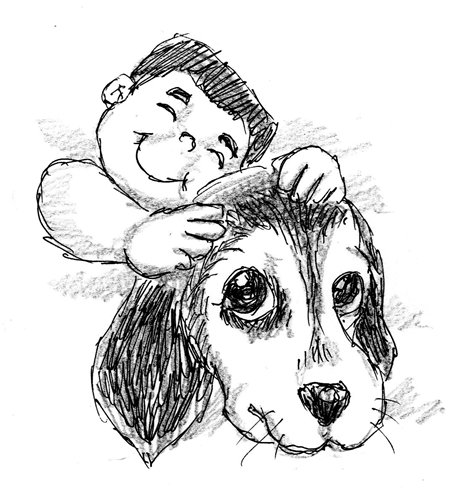HOME >> OPINION
Eating dog meat is a meaty issue in the country
By Yan Yunming Source:Global Times Published: 2019/5/30 18:23:41

Illustrations: Peter C. Espina/GT
Born in Year of the Dog, I'm a dog person. My mother often takes delight in talking about anecdotes from my childhood days and these tales almost always have to do with man's best friend. When I played outdoors at the age of three, our neighbor's giant husky suddenly rested his forepaws on my shoulders. My mom's heart was in her mouth when she saw that, she told me, "but you were patting his head with hearty laughter!"
I was longing for having my own dog for years, but failed due to various reasons. Two years ago, I finally adopted a mixed-breed puppy named Bean, fulfilling my years-long dream. He is exactly like an angel and brings so much joy to my family. Every time I cuddle him, I feel all my troubles evaporating.
Sadly, not all of Bean's species are fortunate.
It was reported that some dog lovers found a kennel in Liangshan prefecture, Southwest China's Sichuan Province. To rescue over 300 dogs destined for the table, around 50 volunteers gathered outside the kennel from May 23, not allowing the owner from going anywhere. Some protesters even traveled miles from Xi'an, Northwest China's Shaanxi Province, to participate in the siege.
However, the kennel owner claimed his business was legitimate, and stubbornly refused to let go of his dogs worth more than 100,000 yuan ($15,000).
After failed talks, dispute between the two sides has escalated, forcing local authorities to intervene. Still in a stalemate, this "dog saving operation" has sparked widespread controversy.
It is not the first time that dogs in China have been thrown into the spotlight. For instance, the annual Lychee and Dog Meat Festival in Yulin, South China's Guangxi Zhuang Autonomous Region, has already gained infamy worldwide, and has become a potent source of generating and reinforcing stereotypes.
While studying in the UK last year, the teenage son of my host family once asked me, "Do you really eat dogs?" I was speechless. On the one hand, I hated to strengthen the British boy's unpleasant impression of China. On the other, I had to admit that many Chinese do eat dogs, although such consumption has been significantly declining.
Even a dog lover like me once ate one slice of dog meat because of my relatives' pestering when I was young. They kept telling me that the meat came from edible dogs, which are different from pet ones. But I feel guilty till now and never touched another slice all my life. I have also hardly seen any of my relatives eat dogs in recent years.
The tradition of eating dog meat goes back centuries. Not only in China, but also in many Asian cultures including Korea, Japan, Vietnam, northeastern India and the Philippines, dog meat is part of the cuisine. But with the passage of time, some places in China have started to ban dog meat, such as Hong Kong and Taiwan. Yet no related laws or regulations have been made in the Chinese mainland.
China is enormous, with multifarious cultures and traditions. It is thus extremely hard for all people to accept or give up certain practices. Some consider dog meat eating completely unacceptable, while others take it as a ritual and even rely on such business to support their family.
Can we tell who is right or wrong? Can we simply judge a person by whether he/she eats dogs or not? I think the answers are "No."
One comment under the news post read, "I love dogs too. But the love cannot become the reason to harass others. If dog-selling is not allowed, should pig lovers start a protest and oppose pig trade and slaughter?"
Yes. The love of dogs is worthy of respect, but it may turn sour when it becomes an excuse to meddle in other individuals' legitimate business and normal life. It would be more appropriate for dog lovers to gradually change people's attitude and wait for a legal weapon.
I sincerely hope Bean, and every best friend of mankind like him, are beloved and well-protected, in a reasonable and rational way.
The author is a reporter with the Global Times. yanyunming@globaltimes.com.cn
Posted in: VIEWPOINT